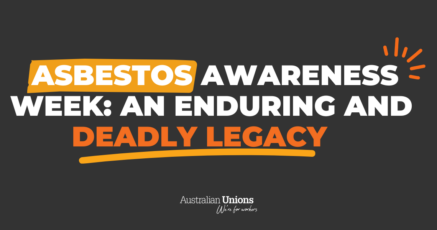In most workplaces in Australia, you can flush a toilet and wash your hands without a second thought. But for many tradies, running water is a luxury.
A recent survey from the Electrical Trades Union (ETU) found that one in five workers don’t always have running water in work bathrooms and one in six workers didn’t have any on-site toilets at all.
With women making up only two per cent of workers in the industry, apprentice electrician Carlin explained that she faced enough barriers at work without having to worry about toilets too.
“It’s pretty much become the cultural norm to try to deal with it and it shouldn’t be, because they [toilets and water] are basic human necessities,” she said.
Nowhere to go
When toilets are available on work sites, they are often incredibly unhygienic and rarely have sanitary bins.
Brisbane-based electrician Vashti described how even when there is toilet is available for her, it’s often hundreds of metres away.
“Someone complained about me not being on site because I would go to the toilet and be gone for a 20-minute circuit, essentially,” she said.
Carlin said that for city-based jobs, she would sometimes have to rely on bathrooms in fast food eateries. But out in the country, it was a lot worse.
“If you get called out to remote, rural areas, there’s not a toilet in sight for hours,” she said.
“I have a lot of concern with rural areas and not being able to have the required PPE provided to be able to dispose of sanitary items while out in the bush.”
One of Carlin’s coping strategies was to simply hold on.
The ETU’s Nowhere To Go report found that she was far from the only one. Women reported not drinking water at all on a 12-hour shift, risking dehydration and fatigue.
You can check out some of the gross conditions of on-site toilets on the ETU website. Be warned: they’re pretty nasty.
The clean-up campaign
Suitable toilets aren’t a nice optional extra. Access to hygienic bathrooms is a work health and safety requirement.
Unfair access to toilets in blue-collar industries has been a recurring problem for working women and is a frequent topic at the annual Women In Male Dominated Industries conference (keep an eye out for the 2023 one later this year).
Not only is the current situation unacceptable but it is easily fixed. Members of the ETU have demanded the Federal Government to step up.
Health and safety laws need to set minimum standards for workplace bathrooms: they must be regularly serviced, accessible, suitable, and open – for every worker.
If you are avoiding appallingly shoddy bathrooms at work, don’t hold on. Contact your union.
Sexism at work is never ok. When you make up only two per cent of an industry, it’s even more important to be in a union that will always be there to support you.
Cover photo credit: Craig Whitehead on Unsplash







SHARE:
The disgusting problem women tradies face on-site